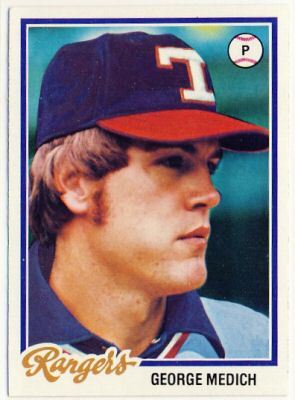George Medich—Topps Company—1978 (No. 583)
The word "heroes" has taken on additional and perhaps even more bewildering meaning because of the popularity of a first-season television show featuring that very name. For a much longer time, the word "heroes" has been attached to figures from the sports world, often with results no less confusing or ambiguous.
For the most part, baseball players are not heroes. (They shouldn’t be role models either, but they nonetheless are, given the widespread influence they have on the younger set.) The truly heroic figures in American society are the underpaid teachers, the studious doctors, the honest police officers, and the selfless members of the military. Yet, in some cases, baseball players can truly double as heroes. In 1978, a handsome veteran pitcher named George Medich earned that distinction.
Coming up as a rookie with the New York Yankees in 1972, Medich went on to post a solid career as a starting pitcher. Medich’s career began encouragingly with the Yankees, but his years in Pinstripes coincided with the team’s final few failures before the eventual pennant glory of 1976. (Still, Medich did contribute to that level of success indirectly, as the principal trade bait sent to the Pittsburgh Pirates for a second baseman named Willie Randolph.) A solid No. 3 starter, Medich went on to win 124 games for the Yankees, Pirates, Texas Rangers, Oakland A’s, Seattle Mariners, New York Mets, and Milwaukee Brewers. As if the travels and demands of a typically lengthy major league season didn’t sap enough of his time, Medich taxed himself further by attending medical school, eventually earning his degree from the University of Pittsburgh. While all of his Topps cards list him as George Medich, his procession through the rigors of medical school prompted most baseball people to refer to him as Doc Medich.
Although the travails of the long baseball season forced Medich to subvert some of his healing passions, he did put his medical training to good use under the most dire of circumstances. During a 1976 game between the Pirates and Philadelphia Phillies, Medich made his way into the stands at Veterans Stadium to perform CPR on a 74-year-old man who had suffered a heart attack. While awaiting the arrival of an ambulance, Medich performed mouth-to-mouth resuscitation. Medich’s efforts notwithstanding, the elderly man died later in the day.
Two years later, Medich’s heroic ventures paid off far more tangibly. On July 17, 1978, another man suffered a heart attack during a game at Memorial Stadium between Medich’s Rangers and the hometown Baltimore Orioles. Medich once again rushed into the stands and performed CPR on the 61-year-old victim. An emergency medical services team soon arrived and rushed the man to a local hospital, where he received further treatment. This man recovered from the heart attack, surviving to live several more years. He likely would not have enjoyed those "extra" years if not for the quick and effective reactions of a right-hander/doctor named George "Doc" Medich.
After his pitching days, Medich became a successful orthopedic surgeon. He eventually opened up an orthopedic clinic in Beaver, Pennsylvania. Unfortunately, his story did not end up happily ever after, at least not in the way that we expect it will with Hayden Panettiere. In a shocking post-baseball development, the onetime medical hero eventually ran intro trouble with the law. In 2001, the 53-year-old Medich was found guilty of illegally possessing painkillers and sentenced to nine years probation. Pleading guilty to 12 counts of possession of a controlled substance, Medich had written a dozen false prescriptions in the names of his patients so that he could obtain painkillers for himself. Explaining that Medich had struggled with drug addiction for years, his lawyer called his crime a "cry for help."
Sadly, even our truly legitimate sports heroes have their blemishes.
Bruce Markusen is the author of the award-winning A Baseball Dynasty: Charlie Finley’s Swingin’ A’s and the writer of MLB.com’s Cooperstown Confidential, found at www.bruce.mlblogs.com. Bruce, his wife Sue, and their daughter Madeline reside in Cooperstown, NY, a stone’s throw from the National Baseball Hall of Fame and Museum.



